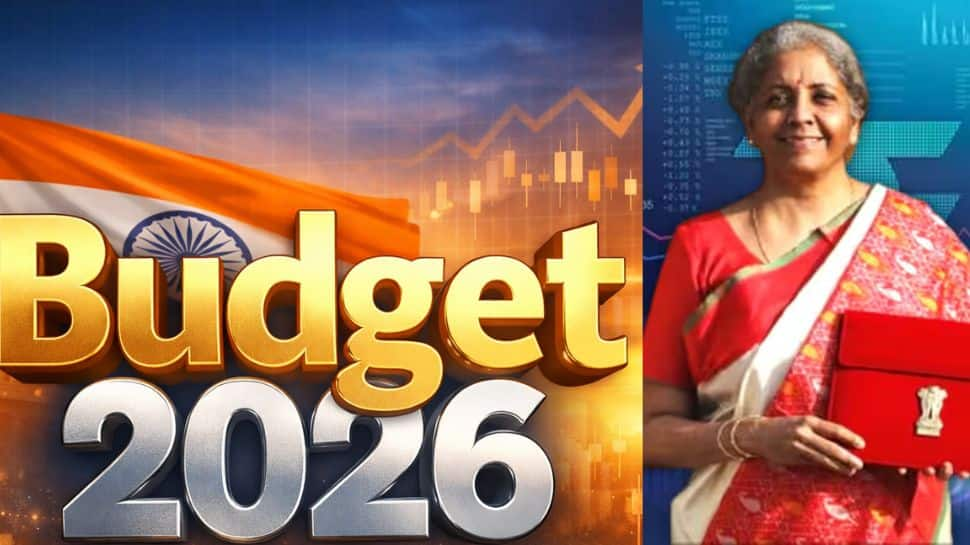Politics
Trump expresses desire to meet North Korea’s Kim once more
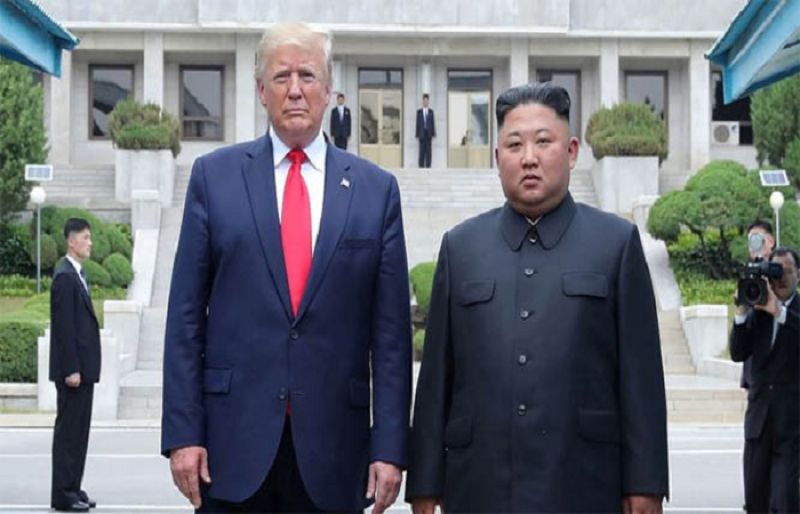
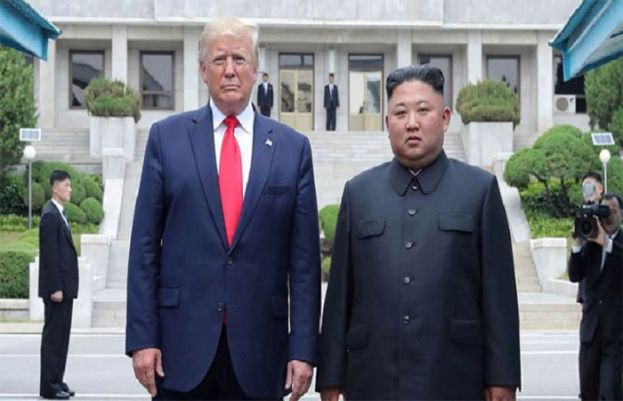
US President Donald Trump said Monday that he hopes to meet again with North Korea’s Kim Jong Un, possibly later this year, as he held White House talks with South Korea’s new progressive leader, Lee Jae Myung.
Hours before Lee’s first long-planned visit to the White House, Trump took to social media to criticize what he called a “Purge or Revolution” in South Korea, seemingly over raids involving churches.
During a 40-minute Oval Office meeting in which Lee praised Trump, the US President softened his earlier remarks, saying, “I’m sure it’s a misunderstanding” as “there is a rumor going around.”
Trump expressed confidence that he and Lee share similar views on North Korea. He recalled meeting Kim Jong Un three times during his first term and said he knows the North Korean leader “better than anybody, almost, other than his sister.”
“Someday I’ll see him. I look forward to seeing him. He was very good with me,” Trump told reporters, adding that he hopes the meeting can happen this year.
Trump previously remarked that he and Kim “fell in love” during their encounters, which eased tensions but did not result in a lasting agreement.
But Kim has since been emboldened by the war in Ukraine, securing critical support from Russia after sending thousands of North Korean troops to fight.
North Korea has dug in and refused any talk of ending its nuclear weapons program.
Trump Tower’ in Pyongyang
Lee, a former labor rights lawyer who has criticized the US military in the past, immediately flattered his host and said Trump has made the United States “not a keeper of peace, but a maker of peace.”
“I look forward to your meeting with Chairman Kim Jong Un and construction of Trump Tower in North Korea and playing golf” there, Lee told him.
He even cited propaganda from North Korea that denounced South Korea by noting that Pyongyang said the relationship with Trump was better.
Kim “will be waiting for you,” Lee told him.
In a speech after his meeting, Lee warned that North Korea could soon produce 10 to 20 nuclear weapons per year as well as a missile that can hit the United States — despite pressure and sanctions.
“The hard fact is that the number of nuclear weapons that North Korea possesses has increased over the past three to four years,” Lee said at the Center for Strategic and International Studies.
He highlighted his overtures to the North such as stopping the blaring of anti-Kim messages over loudspeakers on the military frontier.
Lee was elected in June after the impeachment of the more hawkish Yoon Suk Yeol, who was removed from office after briefly imposing martial law.
The raids denounced by Trump likely referred in part to investigations surrounding Yoon’s conservative allies.
Seeking to buy base
Korean Air announced after the talks that it would buy more than 100 aircraft from US manufacturer Boeing, as Trump presses allies hard for business.
Trump, who frequently accuses European allies of freeloading off the United States, made clear he would seek greater compensation by South Korea over the 28,500 US troops in the country.
He suggested the United States could seek to take over base land, an idea likely to enrage Lee’s brethren on the South Korean left.
“We spent a lot of money building a fort, and there was a contribution made by South Korea, but I would like to see if we could get rid of the lease and get ownership of the land where we have a massive military base,” Trump said.
He also spoke bluntly about one of South Korea’s most delicate issues: so-called “comfort women” who were forced into sexual slavery during Japan’s 1910-1945 rule.
The South Korean left has historically been outspoken about Japan’s legacy, although Lee visited Tokyo on his way to Washington, a highly symbolic stop praised by Trump.
Japan had agreed to compensate comfort women but the deal was criticized by survivors who questioned Tokyo’s sincerity.
Politics
Former South Korean president yoon sentenced to five years in prison
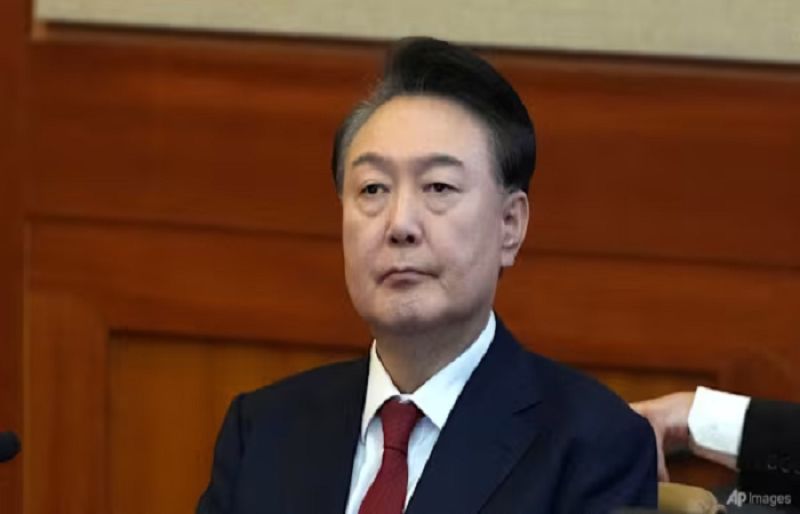

A South Korean court on Friday sentenced former President Yoon Suk Yeol to five years in prison on charges that included obstructing attempts by authorities to arrest him following his failed bid to impose martial law in December 2024.
The Seoul Central District Court found Yoon guilty of mobilising the presidential security service to block authorities from executing an arrest warrant that had been legally issued by a court to investigate him for his martial law declaration.
In televised proceedings, he was also found guilty of charges that included fabricating official documents and failing to comply with the legal process required for martial law.
The ruling is the first related to the criminal charges Yoon faces over his botched martial law declaration.
“The defendant abused his enormous influence as president to prevent the execution of legitimate warrants through officials from the Security Service, which effectively privatised officials … loyal to the Republic of Korea for personal safety and personal gain,” the lead judge on the three-justice panel said.
Speaking outside the court immediately after the decision, one of Yoon’s lawyers, Yoo Jung-hwa, said the former president would appeal the ruling. “We express regret that the decision was made in a politicised manner,” she said.
He could face the death sentence in a separate trial on a charge of masterminding an insurrection by declaring martial law without justification.
Yoon has argued it was within his powers as president to declare martial law and that the action was aimed at sounding the alarm over the obstruction of government by opposition parties.
Yoon, who also denied Friday’s charges, could have faced up to 10 years in jail over the obstruction charges related to when he barricaded himself inside his residential compound in January last year and ordered the security service to block investigators.
He was finally arrested in a second attempt involving more than 3,000 police officers. Yoon’s arrest was the first ever for a sitting president in South Korea.
Parliament, joined by some members of Yoon’s conservative party, voted within hours to overturn his surprise martial law decree and later impeached him, suspending his powers.
He was removed from office in April last year by the Constitutional Court, which ruled he violated the duties of his office.
While Yoon’s bid to impose martial law lasted only about six hours, it sent shockwaves through South Korea, which is Asia’s fourth-largest economy, a key US security ally, and long considered one of the world’s most resilient democracies.
Politics
South Korean ex-leader jailed for 5 years in first martial law verdict
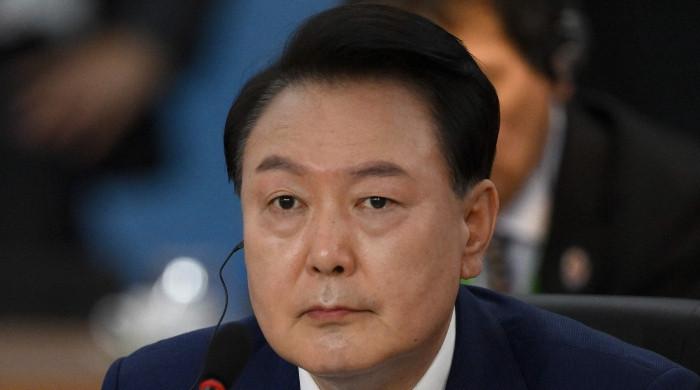
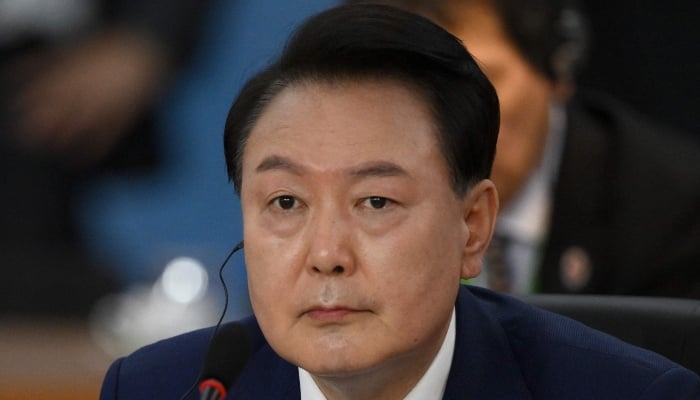
- Judge finds Yoon guilty of obstructing justice and other crimes.
- Separate insurrection verdict is scheduled for February 19.
- Yoon faces another trial over alleged drone flights to North Korea.
SEOUL: A South Korean judge sentenced former president Yoon Suk Yeol on Friday to five years in prison for obstructing justice and other crimes linked to his disastrous martial law declaration and in its chaotic aftermath.
It is the first in a series of verdicts for the disgraced ex-leader, whose brief suspension of civilian rule in South Korea on December 3, 2024 prompted massive protests and a showdown in parliament.
Now ousted from power, he faces multiple trials for actions taken during that debacle and in the turmoil that followed.
On Friday Judge Baek Dae-hyun at Seoul’s Central District Court said he found Yoon guilty of obstruction of justice by blocking investigators from detaining him.
Yoon was also found guilty of excluding cabinet members from a martial law planning meeting.
“Despite having a duty, above all others, to uphold the Constitution and observe the rule of law as president, the defendant instead displayed an attitude that disregarded the… Constitution,” Baek said.
“The defendant’s culpability is extremely grave,” he said.
But Yoon was not guilty of forging official documents due to lack of evidence, the judge said.
Yoon has seven days to appeal, he added.
Prosecutors had called for a 10-year prison term, while Yoon had insisted no law was broken.
Yoon defiant
It comes days after prosecutors in a separate case demanded Yoon be sentenced to death for his role as the “ringleader of an insurrection” in orchestrating the imposition of martial law.
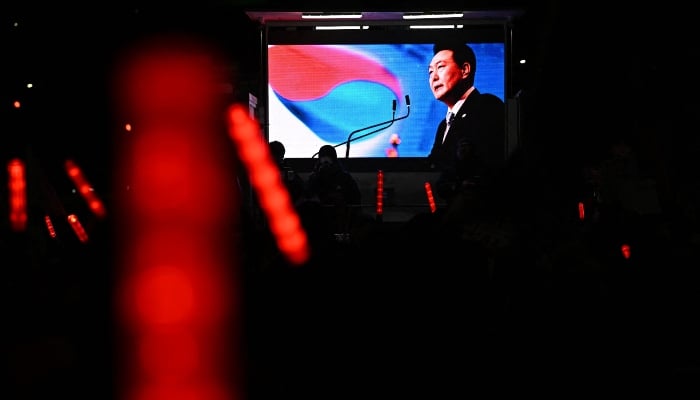
They argued Yoon deserved the severest possible punishment as he had shown “no remorse” for actions that threatened “constitutional order and democracy”.
If he is found guilty it is highly unlikely the sentence will actually be carried out, as South Korea has had an unofficial moratorium on executions since 1997.
Yoon was seen smiling in court as the prosecutors demanded the punishment.
And the former leader and top prosecutor has remained defiant, saying his martial law declaration was a lawful exercise of his presidential authority.
In closing remarks on Tuesday, he insisted the “exercise of a president’s constitutional emergency powers to protect the nation and uphold the constitutional order cannot be deemed an act of insurrection”.
He accused the then-opposition party of having imposed an “unconstitutional dictatorship” through their control of the legislature.
“There was no other option but to awaken the people, who are the sovereign.”
The court is scheduled to rule on the insurrection charges on February 19.
Yoon also faces a separate trial on charges of aiding the enemy, over allegations he ordered drone flights over North Korea to bolster his case for declaring martial law.
Politics
Trump accepts Nobel medal from Venezuelan opposition leader Machado
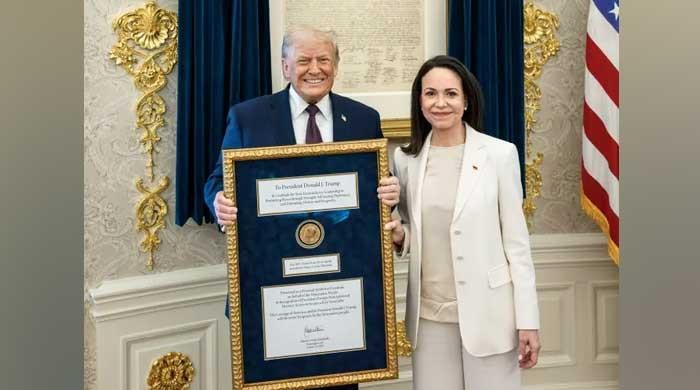
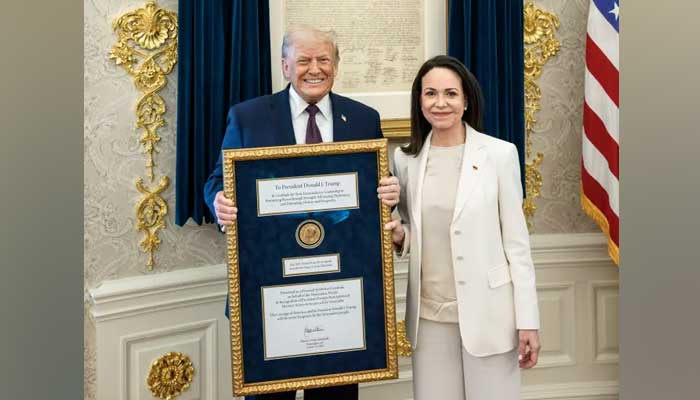
- Machado says meeting was ‘excellent,’ but did not elaborate.
- Encounter comes as Trump has praised Caracas’ interim leader.
- Trump has prioritised securing access to Venezuelan oil.
WASHINGTON: Venezuelan opposition leader Maria Corina Machado gave her Nobel Peace Prize medal to US President Donald Trump on Thursday during a White House meeting, as she tries to gain some influence over how the president shapes the South American country’s political future.
A White House official confirmed that Trump intends to keep the medal.
In a social media post on Thursday evening, Trump wrote: “Maria presented me with her Nobel Peace Prize for the work I have done. Such a wonderful gesture of mutual respect. Thank you Maria!”
Machado, who described the meeting as “excellent,” said the gift was in recognition of what she called his commitment to the freedom of the Venezuelan people.
Machado’s attempt to sway Trump came after he dismissed the idea of installing her as Venezuela’s leader to replace the deposed Nicolas Maduro. Trump openly campaigned for the prize before Machado was awarded it last month and complained bitterly when he was snubbed.
Though Machado gave Trump the gold medal that honorees receive with the prize, the honor remains hers; the Norwegian Nobel Institute has said the prize cannot be transferred, shared or revoked.
Asked on Wednesday if he wanted Machado to give him the prize, Trump told Reuters: “No, I didn’t say that. She won the Nobel Peace Prize.”
The Republican president long expressed interest in winning the prize and has at times linked it to diplomatic achievements.
The lunch meeting, which appeared to last slightly over an hour, marked the first time the two have met in person. Machado then met with more than a dozen senators, both Republican and Democratic, on Capitol Hill, where she has generally found more enthusiastic allies.
While the visit was ongoing, White House press secretary Karoline Leavitt said Trump had been looking forward to meeting Machado, but that he stood by his “realistic” assessment that she did not currently have the support needed to lead the country in the short term.
Machado, who fled Venezuela in a daring seaborne escape in December, is competing for Trump’s ear with members of Venezuela’s government and seeking to ensure she has a role in governing the nation going forward.
After the US captured Maduro in a snatch-and-grab operation this month, various opposition figures, members of Venezuela’s diaspora and politicians throughout the US and Latin America have expressed hope that Venezuela will begin the process of democratisation.
-

 Politics1 week ago
Politics1 week agoUK says provided assistance in US-led tanker seizure
-

 Entertainment1 week ago
Entertainment1 week agoDoes new US food pyramid put too much steak on your plate?
-

 Entertainment1 week ago
Entertainment1 week agoWhy did Nick Reiner’s lawyer Alan Jackson withdraw from case?
-

 Sports5 days ago
Sports5 days agoClock is ticking for Frank at Spurs, with dwindling evidence he deserves extra time
-

 Business1 week ago
Business1 week agoTrump moves to ban home purchases by institutional investors
-

 Sports1 week ago
Sports1 week agoPGA of America CEO steps down after one year to take care of mother and mother-in-law
-

 Tech4 days ago
Tech4 days agoNew Proposed Legislation Would Let Self-Driving Cars Operate in New York State
-
Sports7 days ago
Commanders go young, promote David Blough to be offensive coordinator




